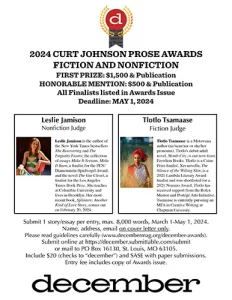Western Humanities Review – Fall 2012
Volume 66 Number 3
Fall 2012
Biannual
Julie Nichols
Western Humanities Review is the literary journal of the University of Utah’s Department of English. This special issue, the product of collaboration between the Western Humanities Association (WHA) and the University of California Global Health Institute Center for Expertise in Women’s Health and Empowerment (CEWHE), “represents the intellectual work of contributors as well as the exchanges and discussions at both the annual WHA conference meeting [and] CEWHE colloquia seminars.” There is no fiction, creative nonfiction, or poetry in this issue. Instead, five scholarly essays discuss “the intersection of women’s empowerment, health rights . . . and new science and technologies that are transforming health and health-care in an increasingly globalized world.” Singly and collectively, these arguments are consummate examples of passionate, knowledgeable, logically persuasive prose. The attentive reader is well repaid for her diligence with timely interrogations of political, economic, and ideological assumptions driving global programs allegedly dedicated to women’s empowerment and health.
Western Humanities Review is the literary journal of the University of Utah’s Department of English. This special issue, the product of collaboration between the Western Humanities Association (WHA) and the University of California Global Health Institute Center for Expertise in Women’s Health and Empowerment (CEWHE), “represents the intellectual work of contributors as well as the exchanges and discussions at both the annual WHA conference meeting [and] CEWHE colloquia seminars.” There is no fiction, creative nonfiction, or poetry in this issue. Instead, five scholarly essays discuss “the intersection of women’s empowerment, health rights . . . and new science and technologies that are transforming health and health-care in an increasingly globalized world.” Singly and collectively, these arguments are consummate examples of passionate, knowledgeable, logically persuasive prose. The attentive reader is well repaid for her diligence with timely interrogations of political, economic, and ideological assumptions driving global programs allegedly dedicated to women’s empowerment and health.
The issue has been ably edited by Galen Joseph and Dorothy Porter, who contextualize and summarize the five articles in their succinct introduction. It is tempting to praise both editors and contributors for the thorough literature review, theoretical situating, and persuasive synthesis that is simply to be expected of the best academic writing—which is to say that this issue reflects an admirable standard of thought and expression. If you donate to FINCA or Heifer, as I do; if you are avidly pro-choice; if you foster strong opinions about the oppression of sex workers—you will find your presumptions radically questioned and reformed here in the cause of re-framing the larger question of women’s empowerment. Global programs that have sought to “aid” women suffer from their own unquestioned assumptions, on which these five articles turn a clear, illuminating light.
In “Women’s Empowerment in Critical Focus: Healthy Reproducers, Political Agents, and Market Participants,” Rachel Niehuus and Carolyn Sufrin show that “empowerment [is] a rich nexus of histories, presumptions, and power dynamics.” Recounting a brief history of global development programs since the 1970s and working with the Foucaultian framework of “biopower,” Niehuss and Sufrin suggest that “when women’s health is used as a vector for empowerment, women are reinterpellated as mothers of the nation, which can promote stratified reproduction and a limited version of citizenship”; that “the focus on political participation in women’s empowerment programs overlooks the multitude of creative ways in which women already act as political agents”; and that “the training of women as market participants in empowerment programs may reinscribe microcredit beneficiaries in new networks of discipline, subjection, and dependence.” They suggest pairing consciousness-raising with “‘translation’—explicitly putting the premises of intervention discourses and their agents in conversation with the assumptions and values of the presumed recipients” (emphasis added). Readers may ask whether the authors’ assumptions about the efficacy of articulation and discussion might be interrogated as well.
Leslie Butt’s report on “Young Female Sex Workers’ Experiences of HIV/AIDS Testing and Treatment in Conditions of Political Violence in Highlands Papua, Indonesia” introduces the idea of “rational sex”: “the [Eurocentric] expectation that people will apply reasoned thinking around changing sexual behavior in order to reduce risk . . . This paper argues that the expectations found in rational sex are put to use at the local level to reinforce the political realities of a contemporary colonial regime.” Butt describes incidents of violence against sex workers in Indonesia to demonstrate how “testing, counseling and medications are made to fit within existing political realities, and the ways they are organized are made to affirm and strengthen existing inequities.” The point is clear and disturbing: assumptions about what should be done in regard to women’s health are rife with complications stemming from the disparities between Eurocentric prescription and local conditions.
In like fashion, Kelly Ray Knight analyzes the complexities of “the public discourse that developed and circulated in the debates about whether prostitution should be decriminalized in San Francisco” as set forth in Proposition K in November 2008. Sharmila Rudrappa argues that labor rights are a more useful category that reproductive rights as a rubric by which “justice in transnational surrogacy” might be addressed. Tracy Weitz asserts that when both pro-choice and pro-life advocates cede authority to scientific “facts,” they downplay or negate the authority of individual women to decide when and whether they can terminate their pregnancies.
All five articles persuasively suggest that basic assumptions about women’s empowerment be revisited. As inevitably happens with the best writing, engaged readers will want to enter and extend these conversations. Western Humanities Review has delivered an excellently-conceived, expertly-executed special issue here, especially for those interested in the intersection of global women’s empowerment and new science and health technologies.
[www.hum.utah.edu/whr]




